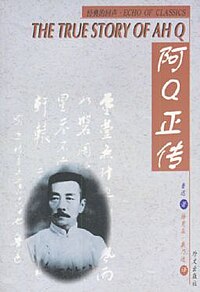Another place I visited while in Zhejiang was the home town of Lu Xun 魯迅 . If someone mentions Luxun, undoubtedly the story of Ah Q straight away comes to his mind. Lu Xun was a famous writer of short stories who was active in the 1920s, the turmoil times in China after the collapse of the Qing Dynasty. I remembered during my early school days, some essays in this book called The True Story of Ah Q 阿Q正传 were in our school's textbook. The author of this book was none other than the great writer Lu Xun who was considered by many to be the leading figure of modern Chinese literature. From young, most of the pupils of my time were exposed to his writings to the extent that we were asked to memorise the texts and answer questions related to the story in our school examinations.
The True Story of Ah Q 阿Q正传 is generally held to be a masterpiece of modern Chinese literature, since it is considered the first piece of work fully to use Vernacular Chinese after the 1919 May 4th Movement in China. It was first published in the Beijing Morning News supplement as a serial. The true story of Ah Q traces the "adventures" of Ah Q, a man from the rural peasant class with little education and no definite occupation. Ah Q is famous for "spiritual victories", Lu Xun's euphemism for self-talk and self-deception even when faced with extreme defeat or humiliation. Ah Q is a bully to the less fortunate but fearful of those who are above him in rank, strength, or power. He persuades himself mentally that he is spiritually "superior" to his oppressors even as he succumbs to their tyranny and suppression. Lu Xun exposes Ah Q's extreme faults as symptomatic of the Chinese national character of his time. The ending of the piece – when Ah Q is carted off to execution for a minor crime – is equally poignant and satirical. In the last act, Ah Q is arrested as a scapegoat for looting and sentenced to death by the governor. When Ah Q is asked to sign a confession, he worries that he cannot write his name. The officers tell him to sign a circle instead. Ah Q is so worried about drawing a perfect circle to save face that he is unaware he would be executed until it is too late. Before his death he tries to entertain the crowds watching his execution, but cannot decide on suitable lines from any Chinese opera (synopsis taken from wikipidia).
In the beginning, Lu Xun's ambition was to become a medical doctor to save as many lives as he possibly could. During those time, standard of living was poor, medical care was expensive and inadequate and beyond the reach of the poor and desolate. As a result many people died for not being able to seek treatment when they fell ill. But later he realised that even if he became a doctor, he could only save a handful of them; these lives were insignificant compared to the large multitude that needed help. He had bigger idea, to do something to change people's mindset, character and attitude which he considered old-fashioned. The people of China had been living under the old feudal systems for too long, the society was corrupt and so were the people . Since this was the era of a new China, people's mindset and behaviour needed to change and China could then be a great nation. After careful consideration, he chose to become a writer and he wanted to excel and achieve fame in the literature circle. He knew if he became famous many people would read his works. As a result, he would be able to influence them using plots and characters he used in his writings. Some of the plots or characters he frequently chosen were satirical in nature. They were designed to attack the old society and its unhealthy culture which poisoned and corrupted people's mind. As a writer, he could reach out to the great multitude, this would be many times better than a medical doctor, who could only save people's lives but not their souls and minds. Hence, the story of Ah Q was just an example he used for this purpose. There were also many other essays and short stories he had written, most of his writings were also translated in other languages and appeared widely in the literature circle internationally. If you look at the success of the nation now, you would have agreed that he had achieved his goals. The renowned artist Wu Guangchong once commented that a hundred Qi Bashi could not compare to one Lu Xun, you can imagine the status of Lu Xun in the people's heart.
I have some photos taken when I was at the residence of Lu Xun during my Zhejiang tour for sharing:
 |
| Lu Xun's hometown |
 |
| Lu Xun's Study |
 |
| Lu Xun's bedroom |
 |
| Lu Xun, figurine made in the 60s |
 |
| The Book |
If you are interested to know more about the writer and his work, please click below:
http://en.wikipedia.org/wiki/Lu_Xun
and http://en.wikipedia.org/wiki/The_True_Story_of_Ah_Q
A poem for sharing:
品甞黄酒来绍兴
鲁迅故里留足印
兰亭溪旁寻古迹
乌蓬船上心连心
No comments:
Post a Comment